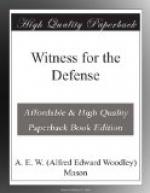“No doubt she will write to you, Mr. Thresk, if she wishes you to know what she is doing. But I should not count upon it if I were you,” said Jane Repton, in a sweet voice and with eyes like pebbles. “She did not mention you, I am sorry to say, when the trial was over.”
She could not forgive him because of her own share in what she now called his “treachery” towards Stella. She had no more of the logician in her composition than Thresk had of the hero. He had committed under a great stress of emotion and sympathy what the whole experience and method of his life told him was one of the worst of crimes. And now that its object was achieved, and Stella Ballantyne free, he was in the mood to see only the harm which he had done to the majesty of the law; he was uneasy; he was not troubled by the thought that discovery would absolutely ruin him. That indeed did not enter into his thoughts. But he could not but make a picture of himself in the robe of a King’s Counsel, claiming sternly the anger of the Law against some other man who should have done just what he had done, no more and no less. And so when Mrs. Repton’s door was finally closed upon him, and no message was given to him from the woman he had saved, he was at once human and unheroic enough to visit a little of his resentment upon her. He had not spoken to her at all since the night at Chitipur; he had no knowledge of the stupor and the prostration into which, after her years of misery, she had fallen; he had no insight into the one compelling passion which now had her, body and soul, in its grip. He turned away from the door and went back to the Taj Mahal. A steamer would be starting for Port Said in two days and by that steamer he would travel. That Stella was in the house on the Khamballa Hill he did not doubt, but since she had no word or thought to spare for him he could not but turn his back and go.
Stella herself got up to dinner, and after it was over she told her friends of the longing which filled her soul.
“All through the trial,” she said shyly, with the shrinking of those who reveal a very secret fancy and are afraid that it will be ridiculed, “in the heat of the court, in the close captivity of my cell, I was conscious of just one real unconquerable passion—to feel the wind blowing against my face upon the Sussex Downs. Can you understand that? Just to see the broad green hills with the white chalk hollows in their sides and the forests marching down to the valleys like the Roman soldiers from Chichester—oh! I was mad for the look and the smell and the sounds of them! It was all that I thought about. I used to close my eyes in the dock and I was away in a second riding through Charlton Forest or over Farm Hill, or looking down to Slindon from Gumber Corner, and over its woods to the sea. And now that I am free”—she clasped her hands and her face grew radiant—“oh, I don’t want to see people.” She reached out a hand to each of her friends. “I don’t call you people, you know. But even you—you’ll understand and forgive and not be hurt—I don’t want to see for a little while.”




